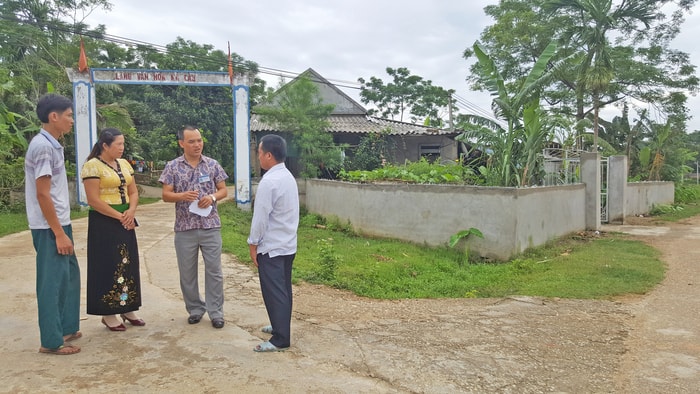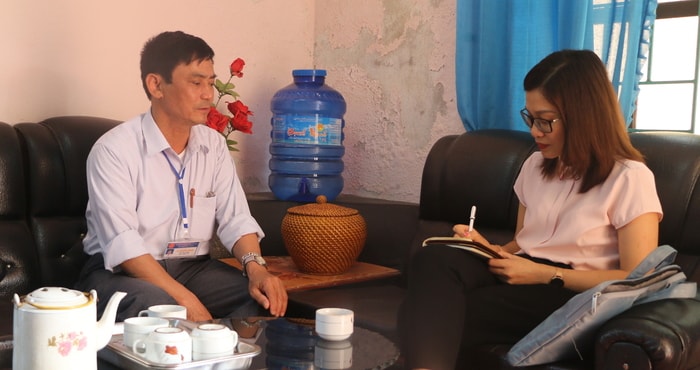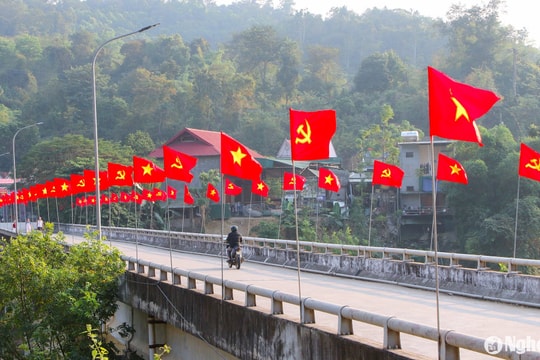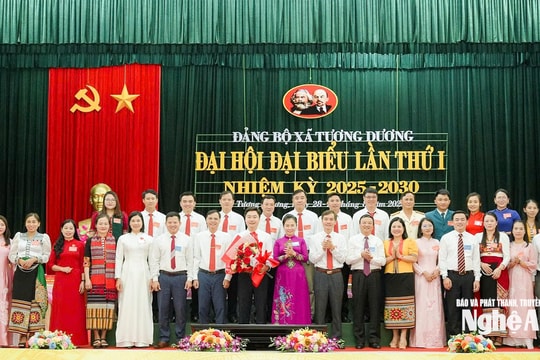Staff rotation according to Resolution 11 of the Politburo: Ensuring 'right person, right job, right time'
(Baonghean) - One of the tasks set for the 2015 - 2020 term of Nghe An province is to build a team of cadres with sufficient capacity, qualities and prestige, equal to the task.
To do so, party committees at all levels must focus on training and fostering cadres in both theory and practice through mobilization and rotation, creating conditions for cadres to try their hand in different environments.
Do good ideological work
The exchange of comrade Truong Hong Phuc - Secretary of Do Luong District Party Committee, said: The work of mobilizing and rotating cadres is a sensitive task, requiring caution, strictness, and a suitable roadmap, ensuring the principles of democratic centralism, impartiality, objectivity, within the planning and plan; combining good ideological work, organizational work at the departure and destination places, avoiding massive, widespread, chasing after quantity...
For positions assigned through election, the Party Committee must lead the implementation of Party and State regulations on personnel work. The rotation process must ensure that the staffing is not "teamed" and that the base is not disrupted.
For cadres, horizontal rotation must be linked to professional planning and capacity, strengths. It is important to make cadres see that rotation is for growth and development opportunities.
From the actual implementation of cadre rotation, comrade Lu Van May - Head of the Organization Committee of Tuong Duong District Party Committee shared: Not only do we do a good job of ideological work before rotation, but after the transfer, the Party Committee must also regularly pay attention, grasp the situation, and help the rotated cadres, especially in the initial stage when they are not familiar with the people and the work, to have timely solutions to resolve problems arising from practice. On the other hand, to motivate cadres to strive with confidence, the organization needs to ensure fairness and accuracy when evaluating the work results of the rotated cadres.
 |
| Comrade Pham Ngoc Nghia (second from right), Secretary of Tien Phong Commune Party Committee, talks with villagers. Photo: PV |
In Dien Chau district, when there is a notice of transfer, the Standing Committee of the District Party Committee will work with the Party Committee of the destination to hear the difficulties and problems that the base needs; meet with the cadres in the transfer and rotation to hear the action plan as well as the thoughts and aspirations of the cadres. From there, create the best conditions and mindset for the transferred person when they return to take up the new job at the base.
Every year, the District Party Committee works with the unit where the transferred cadres come to evaluate the results of the task performance of the transferred person and listen to the implementation plan for the following year, on that basis, make recommendations and help the cadres create a new step forward for the locality and unit.
The transferred cadres themselves all believe that, in order to complete their tasks well, they need consensus and support from the local Party Committee and government as well as the attention, help and support from their superiors. Especially in the case where the transfer place is to a local Party Committee or government that still has a strong local mentality and the fear of "losing their seat", making it difficult for the transferred cadres to work and integrate.
In addition to ideological work, it is necessary to attach importance to inspection and supervision work associated with the development of specific and strong enough regulations to remove from the planning those who are rotated without confirming their capacity, have weak responsibility, and have the mindset of "staying safe" to wait for the day to return.
Removing shortcomings in mechanisms and policies
To encourage transferred cadres to work with peace of mind, some localities have paid attention to ensuring policies and regimes for cadres. For example, in Do Luong, the district has implemented a number of policies such as supporting fuel expenses; cadres who go to the grassroots level still receive full salary as well as other regimes and payroll in the district, while the salary according to the position at the grassroots level is assigned to the locality to use to pay for additional part-time cadres or other administrative work serving the locality.
In Tan Ky, the District People's Council issued Resolution No. 52/2013/NQ-HDND on supporting cadres who are temporarily transferred from the district to work in communes and towns. On that basis, Party committees at all levels and leaders of agencies and units have created favorable conditions and relatively ensured regimes and policies for transferred and transferred cadres.
However, many opinions say that, in order to remove difficulties and stabilize the lives of transferred cadres, especially in remote and extremely difficult areas, the Central Government and the province need to research and issue specific regulations, creating consistency and unity in support policies (initial subsidies, allowances, monthly living expenses, transportation support, etc.) to avoid each place applying different methods as is currently the case.
Due to the fact that rotating cadres from district to commune is difficult due to lack of "vacancies", some localities have requested the Provincial Party Committee to study and propose to the Central Government to arrange for more positions of deputy party secretary or vice chairman of the commune-level People's Committee to rotate district-level cadres to hold these positions. Some localities have also requested the Provincial Party Committee to consider not rotating comrades who have held the positions of member of the district Party Committee Standing Committee, vice chairman of the district-level People's Council - People's Committee (currently).
According to comrade Nguyen Trong Hoang - Secretary of Tuong Duong District Party Committee: Unlike the rotation from the provincial level to the district level (staffing and policies for cadres are guaranteed by the new agency), when district cadres are rotated to the commune, the staffing and basic policies are still guaranteed by the old agency, so increasing a number of positions at the commune level to implement cadre rotation does not generate additional costs.
Based on the review of local recommendations, on July 12, 2017, the Provincial Party Committee issued Notice No. 707 TB/TU amending and supplementing Resolution No. 02 NQ-TU of the Provincial Party Committee on rotation and transfer of leaders and managers.
The adjustment is as follows: Comrades who are already members of the Standing Committee at the district level do not necessarily have to preside over the grassroots level (commune, ward, town) when considering and appointing to higher positions. Comrades who are not yet members of the Standing Committee at the district level, and are planned to hold the positions of Secretary, Chairman of the People's Council, Chairman of the People's Committee at the district level, must preside over the grassroots level (Party Secretary, Chairman of the People's Committee of the commune, ward, town); other cases are encouraged to preside over the grassroots level.
In places where there are difficulties in arranging rotation to communes and towns (due to the small number of positions in charge of grassroots positions that can be rotated), rotation is only required for comrades who are planned to hold the positions of Secretary, Chairman of People's Council, Chairman of People's Committee at district level. This is a timely adjustment to remove difficulties and shortcomings in the current rotation and mobilization of cadres to grassroots levels.
 |
| Comrade Vo Quang Minh - Chairman of Dong Son Commune People's Committee (Do Luong) talked with reporters about the rotation of key officials between communes. Photo: PV |
Rotate the right person, assign the right job
From the practice of rotating cadres, comrade Lang Van Xuan - Head of the Organization Committee of Quy Chau District Party Committee said: To make the rotation work effective, it is necessary to base on the strengths and abilities of cadres, the political tasks of the locality and the intention of arranging cadres after rotation to select cadres and suitable rotation areas; to fight against localism, closed-mindedness, not wanting to accept people from other places or taking advantage of rotation to transfer honest, straightforward, capable people who are not suitable for you to other places.
Comrade Lu Dinh Thi - Secretary of Que Phong District Party Committee also affirmed: Before transferring, the Standing Committee of the District Party Committee must properly evaluate cadres from their professional qualifications, political theory, moral qualities, capacity and development prospects. And based on the needs of each locality, consider and select cadres (in the planning area) to be suitable for the base, while at the same time being able to promote the capacity of the transferred person. Rotating the right cadres, in the right job, at the right time will create consensus and unity in cadre work.
From another perspective, comrade Hoang Van Bo - Standing Deputy Secretary of Quynh Luu District Party Committee said: Resolution 02 of the Provincial Party Committee clearly states that, when the rotation period ends, cadres who are assessed to have completed their tasks well and excellently will be assigned to higher positions; cadres who have completed their tasks will be assigned to equivalent positions; cadres who have not completed their tasks need to be specifically considered for reassignment to other suitable jobs. This has a positive impact, creating motivation for rotated cadres to strive and contribute.
The problem is that the work of evaluating and commenting on transferred and assigned cadres must be truly objective and impartial, avoiding favoritism and formality; taking the results of implementing political tasks and movements in the locality or unit that the cadre is in charge of as a measure of evaluation...
Discussing the work of rotating cadres, comrade Nguyen Xuan Son - Standing Deputy Secretary of the Provincial Party Committee affirmed that the issuance of Resolution 02 by the Provincial Party Committee has an important meaning in contributing to training, educating, practicing, and testing cadres through practice to create a source of cadres in the short and long term; contributing to building a team of cadres and civil servants with sufficient capacity, qualities and prestige, equal to the tasks of socio-economic development, ensuring security and national defense as set out in the Resolution of the 18th Provincial Party Congress, term 2015 - 2020.
In order for Resolution 02 to be effectively implemented, party committees at all levels and each cadre and party member need to clearly understand that the rotation and transfer of cadres and party members is a regular and normal activity in personnel work. Therefore, it is necessary to have a specific plan as well as a strategy to create a source of cadres in the short term as well as in the long term.
In carrying out the work of rotation and transfer, it is necessary to ensure the unified leadership of the Party Committee, to conduct it democratically, publicly, closely, cautiously, resolutely, and in accordance with the process. And the fundamental thing to avoid formalism in rotating cadres is to "correctly evaluate the person, use the right job" and correctly perceive the purpose: rotation to serve the Party, the people, and for common development.
| On March 15, 2016, the Nghe An Provincial Party Committee issued Resolution No. 02 on rotation and transfer of party members, leaders and managers for the period 2016 - 2020 with many new points, clearly defining: the subjects of rotation and transfer (LC, DD) include party members, leaders and managers at all levels, not just leaders and managers as before; the time of LC, DD is at least 3 years or more for men and at least 2 years or more for women. At the end of the probationary period, officers who are assessed to have completed their tasks well and excellently will be proposed to be assigned to a higher position; those who have completed their tasks will be proposed to be assigned to an equivalent position; those who have not completed their tasks will be specifically considered for reassignment to other suitable jobs. The Resolution also requires strengthening inspection, supervision, and building Party discipline and order in cadre training and retraining. |
PV Group
| RELATED NEWS |
|---|

.jpg)
.jpg)



.jpg)
